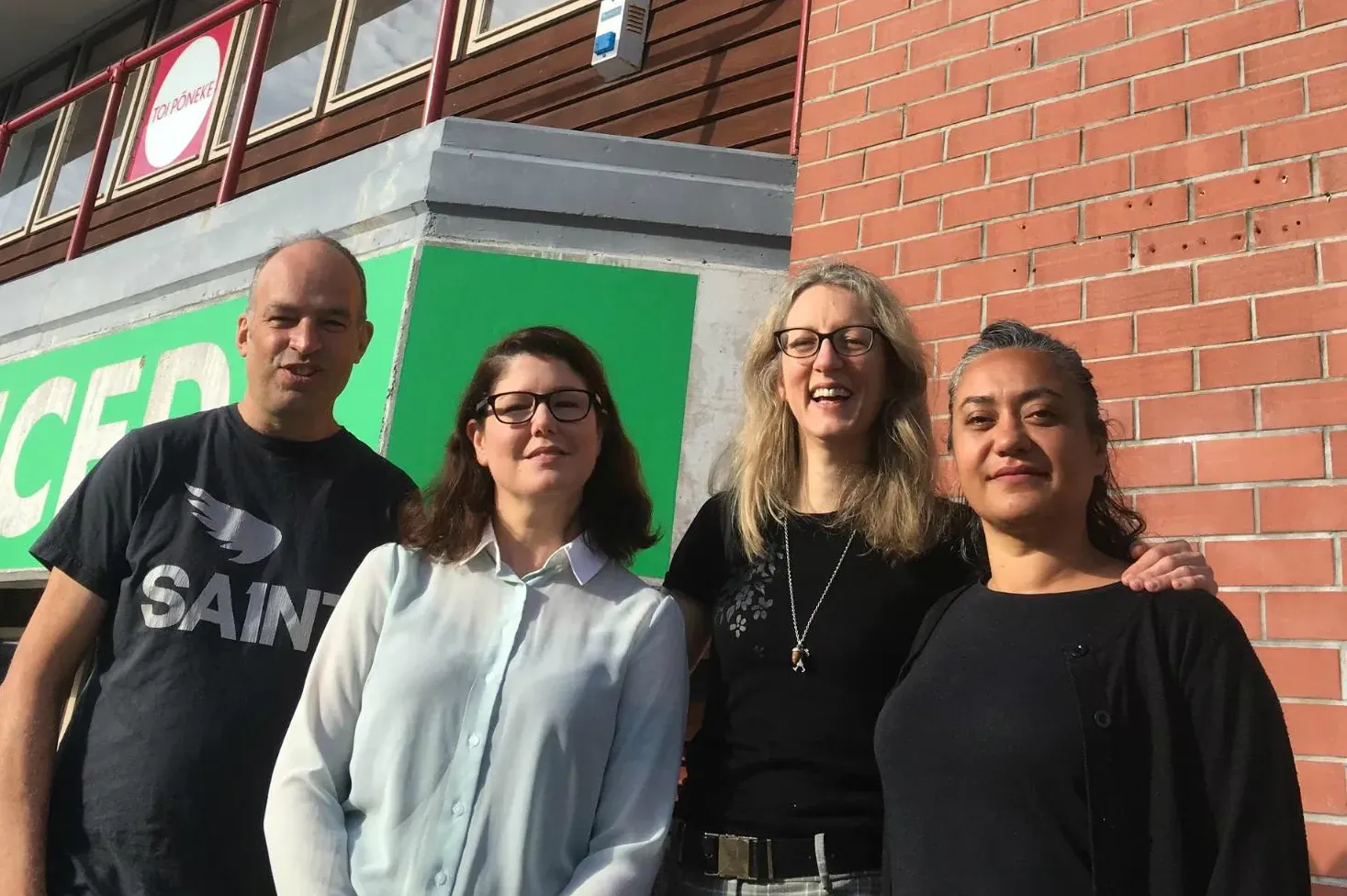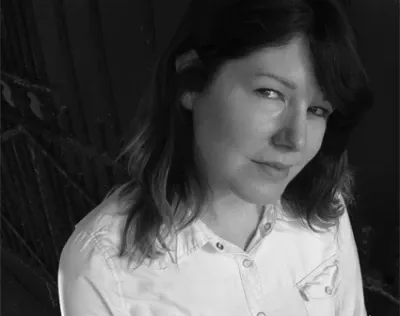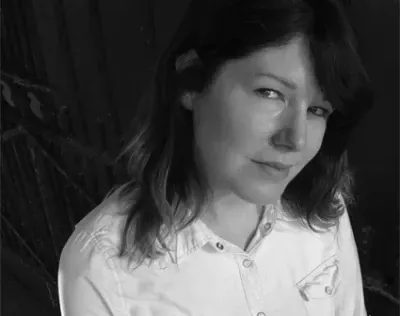Abi King-Jones and the acclaimed writer who sparked her creativity
Written by

“It’s been fantastic. I have a luxurious, top floor, corner office — it’s a lovely space to work in. I’m given an allowance each week to cover my rent and expenses so that I can write full time. I also have three amazing mentors to help me on my journey: Rob Sarkies, Vicky Pope, and Desray Armstrong,” explains Abi King-Jones.
Wellington based writer, Abi King-Jones, is the 2019 recipient of Toi Pōneke Arts Centre’s Write Room Wellington Screenwriter’s Residency. Now in the final weeks of the residency, Abi is working hard to bring her script Out of the Vaipe, the Deadwater to life.
Write Room is a three month residency, based at the Toi Pōneke arts centre, devised in response to the challenges faced by New Zealand screenwriters. It provides writers, like Abi, with an invaluable opportunity to refine and develop their practice.
Abi’s mentors named above, provide her with crucial creative support. They are exceptionally experienced within the New Zealand film industry and possess an impressive list of accomplishments, including producing films such as Stray (Desray Armstrong), Gardening with Soul (Vicky Pope), and directing/writing Two Little Boys (Rob Sarkies).
Cultural connections
Abi’s feature film, Out of the Vaipe, the Deadwater, will be a dramatic adaptation of a memoir by the acclaimed Samoan writer Maualaivao Albert Wendt.
“The memoir details Albert’s early years growing up in Samoa and his subsequent move to New Zealand. In the early 1950s, when he was only thirteen, Albert won a scholarship to come here to study. It was a strange, scary experience for a young Samoan man, who had never left his country before, to come to New Zealand. Basically, the memoir is the story of him discovering language and books — and falling in love with it.”
Wendt’s memoir encapsulates the early years of his life, and the various people and situations that influenced his writing — of particular note is his grandmother, Mele, who was, in a creative sense, his first role-model.
“She was an expert storyteller and would dazzle the neighbourhood children every night with stories, passing on ancient Samoan knowledge, ways, and legends.”
Abi first came across Wendt’s writing while completing her undergrad studies in film, TV and media at The University of Auckland. Wendt was a lecturer there at the time, and she took one of his classes on literature and writing. Abi discovered a strong connection to his work, partly because of their shared Samoan ancestry — later learning that Wendt personally knew some of her family in Samoa.

Abi King-Jones. Credit: Errol Wright
“I became a big admirer of his work, reading most of his novels and short stories. When I went to Samoa, I took his books with me, and they really helped to connect with my own culture — which had been quite distant having been brought up in New Zealand.”
Awakening a passion for social justice
Taking Wendt’s classes at UoA was an eye-opening experience for Abi – not only in terms of what she learnt about literature, but also the things she learnt about the continual injustice of the world.
“What he really awoke in me was the knowledge that racism and colonialism is still very much in the present — it isn't something that merely happened in the past. It’s in every part of our lives, including the books we read or the artwork we experience. Albert lit a spark back then for resistance and rebellion. I wanted to address the inequity present in New Zealand and in the wider Pacific.”
“Albert lit a spark back then for resistance and rebellion. I wanted to address the inequity present in New Zealand and in the wider Pacific.”
Years later, while rifling through Wellington’s Unity Books to find a birthday present for her mother, Abi came across Wendt’s Out of the Vaipe, the Deadwater by pure chance — she didn’t know he had written a memoir and was thrilled with the discovery.
“I had to buy it… while I was reading it I thought, ‘oh, this should be a film,’ and then arrogantly and audaciously my next thought was, ‘well maybe I should make it — I could write it and direct it.’ Luckily when I contacted him about it, he was open to me giving it a go. I'm quite humbled that he has trusted me enough to bring his and his family's life to the screen.”
Finding a way to prioritise creativity
Receiving the Write Room residency has been a dream come true for Abi, allowing her to put all her energy and time into her writing — an otherwise near impossible task.
“Writing a script for Out of the Vaipe, the Deadwater is what I've been wanting to do for so long… but other things have always been more pressing, like finding paid work so I can pay my rent and other bills. I’ve had to do a lot of freelance editing in-between making my own documentaries and short films.
If you've got a day job that takes up your energy and headspace, especially if you have to be fully involved in someone else’s creative project, then you don't really have the capacity to work on your own creativity or writing outside of that. Being able to stop and commit to focusing solely on your own writing or project is so important.”
Finding a sounding board in the form of her mentors has been essential to Abi’s creative process and her ability to craft a script for Out of the Vaipe, the Deadwater.
“Talking, bouncing ideas off, and just being able to have discussions is such a key part of the process. Before the residency, it was just me in a room trying to figure it all out, not really knowing if I was getting it right. With the help of my mentors I've been able to see where the issues are and what to focus on to make it work.”
The Write Room residency culminates in a reading of the first draft of Abi’s script, after which the production process will begin.
“There will be a table read with some actors to see how it works and how the words flow. Then beyond that, the goal is to get in contact with possible producers to see who I can get to move it forward into the production stage and further development.”
